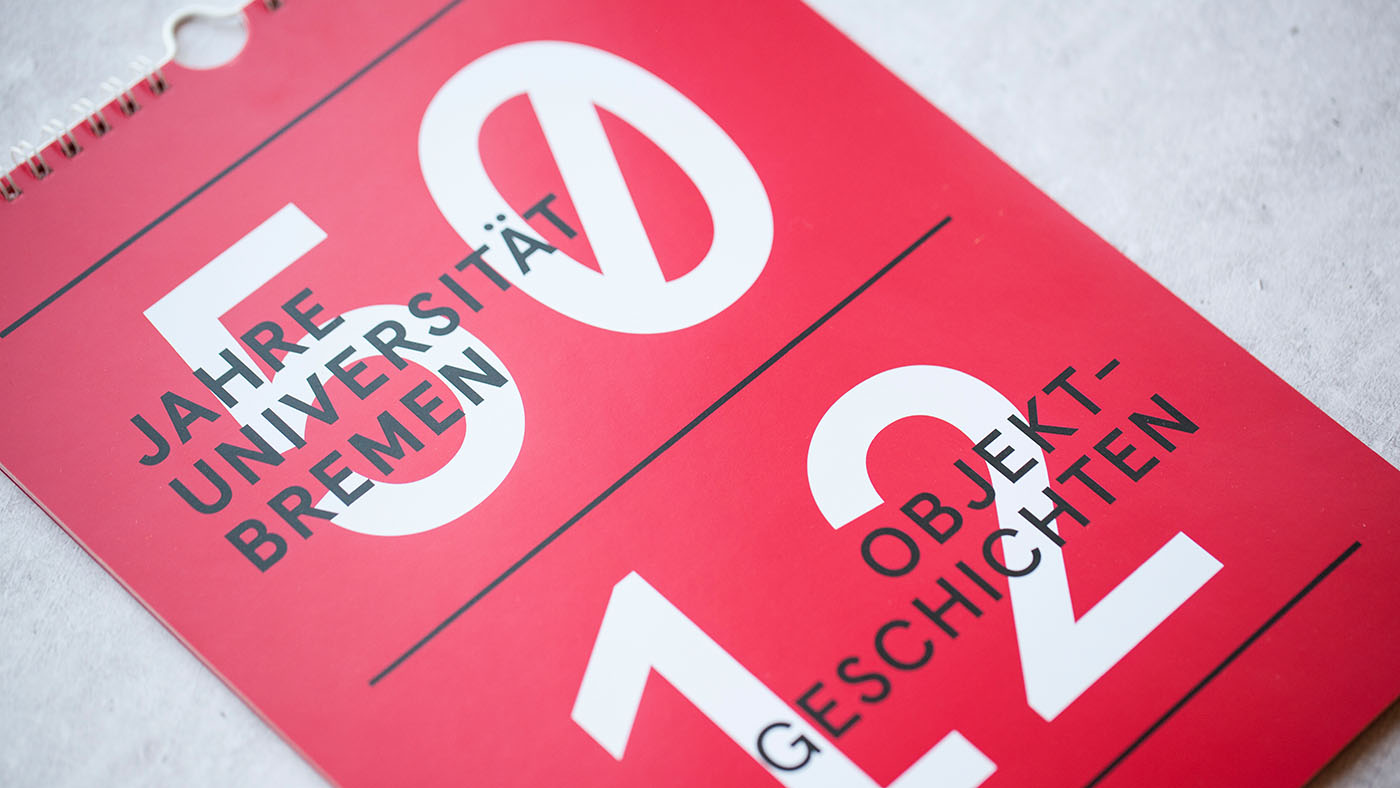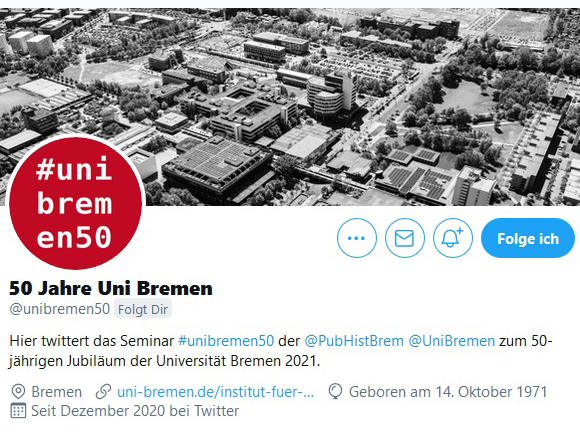
© Jefferson & Högerle
50 Years of the University of Bremen: History for the Public
To mark the jubilee, students in a Public History class have investigated the university’s history and are, amongst other things, posting about historical events on Twitter.
Dr. Thekla Keuck applied for a project via the jubilee fund that she has now brought to life with her students in the winter semester 2020/21: Twelve object histories have been published in calendar form – analogue and digitally. The historian has already offered several seminars on the topic of the University of Bremen’s 50-year history and new ways of passing knowledge on. This opens novel perspectives for students. The results can be seen on the “50 Jahre Uni Bremen” Twitter channel (@unibremen50) as well as under the jubilee hashtag “#UniBremen50”.
Within the History master’s degree, students have the opportunity to specialize in “public history.” The focus is very practically oriented. In order to present the university’s history effectively to the public, the historian Thekla Keuck planned a multi-semester teaching and learning project in the summer semester 2019. The aim: Introducing students to multimedia communication forms in order to pass the historical-scientific contents on to a heterogeneous public. Thekla Keuck focused on the concept of research-based learning and was interested in finding out the students’ ideas. What would they develop if they had the chance to contribute to the creation of the jubilee?
The University’s Story
“At the beginning, one of the questions was how students would like to present objects that tell the university’s story: Which type of text will they choose? What objects are they interested in? We discussed these questions together in the seminar,” explains the history lecturer. Based on material such as documents, objects, or images that the students chose from the Geosciences Collection or the University Archive for example, they prepared the history of the uni for the jubilee in both analogue and digital media forms. A calendar with twelve objects, which has been funded by the “50 Years of the University of Bremen” fund, as well as a website containing the individual calendar stories that the students worked on were created. With stories of people and events, they bring the University of Bremen’s history to life.
Writing Digital History
The first “corona semester” slightly changed the original plan that Keuck had for her multi-semester project. All of a sudden, the digital communication of history took center stage. That is how students in the “Writing University History in Times of Corona” (“Universitätsgeschichte schreiben in Zeiten von Corona”) class in the summer semester 2020 indeed became contemporary witnesses and chroniclers themselves.
Historical Tweets
In the past year, Thekla Keuck discovered the advantages of digital teaching and took part in a series of training sessions where she gained important impulses for her digital seminar concepts. “I was very inspired – in terms of digital presentations, I noticed a definite increase in the students’ quality.”

© Universität Bremen
She realized her aim to make history tangible via social media with the winter semester 2020/21 class “Tweeting University History” (“Universitätsgeschichte twittern”). The „50 Jahre Uni Bremen“ Twitter account that was created will be maintained by the students outside of the seminar. They will regularly post their research findings over the entire course of the jubilee year. All jubilee posts can also be found under the hashtag “#UniBremen50”.
A Move Away from Term Papers and Into the Public Eye
One person who particularly profited from this seminar concept is Eva Voßhans. The 25-year old, who will complete her master’s degree this summer semester, took part in four of Thekla Keuck’s seminars. “In the summer semester 2020, we learnt very practically about the paths that historical research can take in digitalization – and became witnesses of the time thanks to the corona situation,” tells us the student who has discovered new career perspectives through the seminar. “All of this input has changed the way I work, as I now no longer only see historical sources – whether written or tactile – as ‘dusty’ things to be investigated but rather think about how I can present them. And it has opened the door for me to working in a historical agency that I previously never even knew existed.” She would like to continue to work in the field of presenting history in the public eye.
More
The individual pages of the calendar can be found on the Public History project page (in German only).
We are also be handing out ten copies of the calendar: Simply send us an email with the subject line “#UniBremen50” to socialmedia@uni-bremen.de and your name will be put in the pot. The conditions of participation can be found here (in Germoan only).
More info on the jubilee and other projects is available on the “50 Years of the University of Bremen” website.